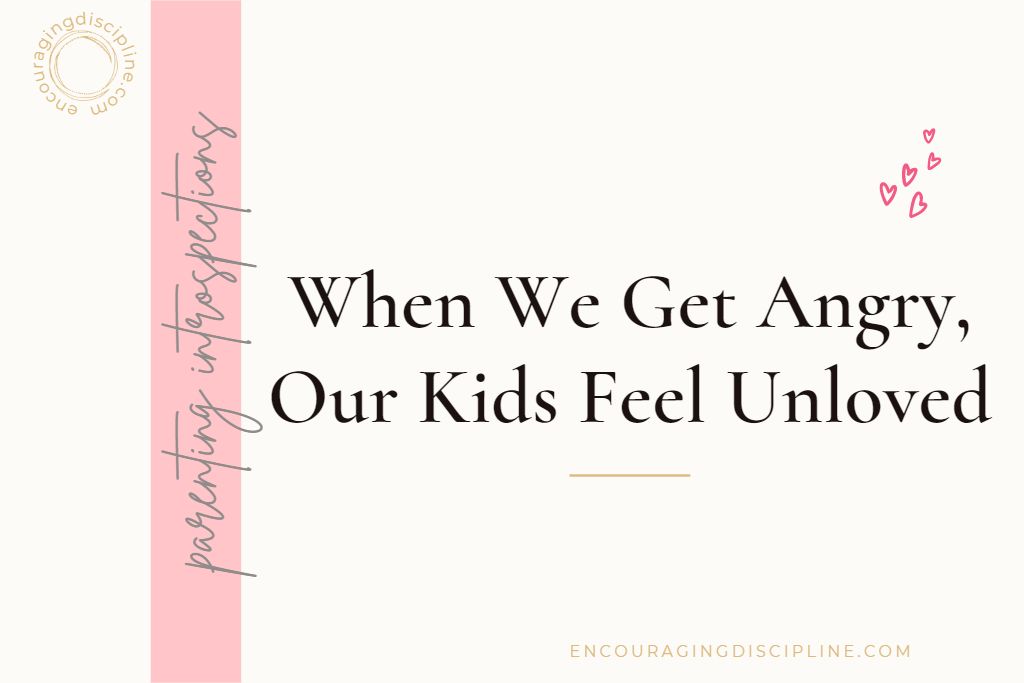When We Get Angry, Our Kids Feel Unloved
Do you ever wonder what your kids feel or think when you’re angry at them? I wonder about what goes on in my kids’ heads and hearts all the time.
Here’s what I learned directly from my child’s mouth.
When we get angry at or impatient with our kids, they feel rejected. How do I know this? Because my son told me.
On different occasions, my son told me “I feel like you hate me right now”, “When you’re angry, I don’t feel like you love me”, and “When you yell at me, I feel scared.”
What a wake-up call! What a shock! I don’t want to make my kids feel any of those things!
But oftentimes we are unaware of the impact that our words, tone of voice, and body language have on our kids. And the truth is, when we get angry, our kids feel unloved.
And what’s even more confusing is that on these two occasions when my son said these statements, I didn’t even think I was being mean to him. I hadn’t raised my voice, I wasn’t shaming, and I didn’t punish. I wasn’t even angry!
But my son had a different take on our interaction. And that’s what’s important.
To give you some context, let me share one of the situations in which he said those things to me. And then I’ll tell you what I did to repair the damage.
The story
It was Sunday morning and I wanted to go to the gym. I was in a hurry because I also had plans to wash my hair and go out to meet with some friends.
My kids and I went over how they would stay occupied while I was away. They brought out some games and started playing.
My son started acting silly, then got frustrated. Because playing games to him is still all about winning. Or not losing. Whichever way you want to look at it. He kicked the chess pieces which flew across the room.
I told him he needs to pick them up. He felt bad about what he had done so he started cleaning up, but he couldn’t find one of the pawns.
He kept whining and complaining, and I was getting more impatient because the clock was ticking. I had to leave. I talked with him quickly and without looking at him and continued taking care of whatever I had to do to get myself ready to leave.
Then, as I was about to walk out the door, my son ran after me and said, “I feel like you hate me right now.”
I stopped in my tracks. I realized that I had been so absorbed by my own agenda, that I wasn’t aware of what my son was experiencing.
So I decided to stop and take a few moments to give him my attention.
I sat down on the steps and he got up into my arms. I held him for what felt like a really long time.
I breathed deeply so I could let go of the time pressure I felt I was under. So I’ll be a few minutes late for the gym. So what?
I wrapped my son closely in my arms. I didn’t say much. I mean, I did reassure him that I didn’t hate him, I explained that I was in a rush and I apologized for not being more attentive to his needs. But then we just stayed there, hugging. I actually showed him that I meant what I was saying.
I realized that it wouldn’t have been enough to simply contradict him and say, “But I do love you!” and then rush out the door. It would have been easy. But not effective.
Just telling him his feelings were wrong was not going to change them. I had to help him feel differently about himself and our interaction and for that my nervous system needed to be aligned with his.
By giving him my time, which he understood I was short of, he knew he was important and valuable to me.
After a few minutes of hugging, my son said something funny and started telling me a story. He was laughing again. Then he ran off to play. I was free to go to the gym.
That’s it.
When we get angry, we can stop to reflect
As I reflect back on this episode, I think of a few things:
- It’s always a good idea to have open communication with our kids, so we can learn how they see things. Otherwise, we remain caught up in our own worlds.
- Understanding our kids’ perspectives also helps us to monitor our own behaviors so we can avoid causing unnecessary ruptures.
- Checking in with our kids offers us the opportunity to repair any unintended damage.
- Our kids are sensitive beings and when we are rushed and don’t make enough eye contact and efforts to connect (touch points), they perceive this as a rupture of our connection.
- Allowing kids enough time to reconnect, slowing down to hold them, and giving them plenty of love allows them to regain their trust and confidence in our relationship.
I hope you will find this helpful when your kids are acting strangely. Let me know what you think.







